Posted March 18, 2002. Revised March 22.

THERE WERE NO MARTIANS.
On the night of Oct. 30, 1938, back when mass media was still clutching its mama’s breast, we learned something significant about how public consciousness works when exposed to unusual, frightening news reports: most people will believe anything.
War of the Worlds was a dramatization of an attack by Martians on (of all places) New Jersey created by Orson Welles, as part of his weekly Mercury Theater on the Air series on CBS radio. The setup for the show was a phony musical entertainment program, into which announcers would interrupt with fictitious news updates of the invasion. Every ten or so minutes, another narrator would break in and explain how the whole program was a fantasy — stating clearly that it was not real. But few people heard that part, or perhaps gave danger the benefit of the doubt. The highways were jammed, and people were packing up their belongings and leaving their homes with wet towels wrapped around their faces as a result of the gas attack by space aliens.
Skip ahead 64 years.
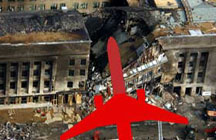
We have been told over and over again that at 9:43 a.m. on Sept. 11, 2001, as part of a “coordinated terrorist attack on the United States,” American Airlines Flight 77 was crashed into the Pentagon, the military headquarters of the free world. Flight 77 was a Boeing 757-200 airliner, weighing about 100 tons (200,000 pounds). According to The New York Times, the jet was crashed into the ground floor of the building at “well over 500 miles per hour,” which would “maximize the destruction and make the plane easier to handle.”
During the six months that we have heard this repeated, in various forms, by every official media outlet in existence, have we ever stopped to question: where is the airplane wreckage?
Why doesn’t this picture make sense? Was it Wonder Woman’s invisible plane?
Where is the impact crater created by a massive projectile hitting the Earth at at least three-quarters of the speed of sound, then exploding?
Why does the building debris fall in the wrong direction?
Where was the massive, widespread fireball that would be created by igniting 7,000 to 9,000 gallons of jet fuel on board the plane, which was headed for a coast-to-coast flight?
Why is the damage to the building so small — narrower than half the wingspan of the airplane that supposedly hit it, with no indication of where the wings made impact, or where they went? Why did the facade of the building fall off, neatly in one hunk, nearly half an hour after the supposed crash (reported in numerous chronologies as 10:10 a.m.)?
Why was the facade not shattered after it was hit by a jet airliner moving at full speed?
I think these are reasonable, obvious questions, the kind you would expect to meet in the first week of an accident investigation course.
Most people I am speaking to (in the media, the environmental community, the legal community, the political community and elsewhere) have never noticed any of this, or questioned what they have seen in print. For six months, I did not notice. I could never understand why there wasn’t plane wreckage, but I never asked myself the question. It was only after a colleague sent me the link to Asile.org, an art web page based in France, that I put it together, but only because it was shown to me.
Have we looked at those photos and presumed that the damage looked so serious, and so disturbing, that we assumed the airliner was “in there somewhere”?
Or did we lose track of this minor detail while we were lost in the shock and horror of flights 11 and 175 plunging into the World Trade Center (repeated endlessly, toasting the image of airplanes flying into buildings into our imaginations from hour one of the crisis), and the subsequent collapse of the towers, and the horror of the crushed people and the 300 lost firefighters, and the emotional overload that followed, and the swell of patriotism, the donated blood, the Red Cross banners everywhere, and then the anthrax scare, and vilifying bin Laden, and the War on Terror, and the faltering economy, and Enron, Kenny Lay and Arthur Anderson, and our scared, confused kids, and the laundry and shopping and the dust buffalo under the kitchen table, and putting our fragile hearts and minds back together here in what’s being called the post-9-11 world?
Do we remember those first days, when anything at all was possible, when the skies had an eerie silence, and nothing made any sense at all? America under attack? Who would think to scour the newspapers and the internet for images of plane wreckage from Flight 77, or to see if the damage to the buildings matched the story we were hearing? Of course there was plane wreckage, somewhere in there.

Photo by Sgt. Cedric H. Rudisill, courtesy of Defenselink.mil, the Army public relations homepage. An original image file, with the original caption and credit, is at this link.
More images
I CANNOT PROVE that something did or did not happen. I was not there, nor was there a press pool gathered outside the Pentagon when the airliner supposedly struck. There is no known video of an airplane hitting the building — but something claiming to be just that was released last week. In this article, I am not going to take the pro-con format, in which I objectively debate the evidence of “both sides.” I am interested, rather, in what happens to us, psychologically and spiritually, when we are confronted with obvious evidence of something that contradicts our previous beliefs, our common sense and the view we hold of the world.
So, first, let’s take a look at the materials in question.
In the world of research, there are two kinds of documents, primary and secondary. Secondary sources are published reports, like newspaper articles. Primary sources, on the other hand, include interviews with involved people such as witnesses and government officials, government documents, court pleadings, financial records, scientific data, photographs, tapes, transcripts, and eyewitness reporting.
Photographs on military web pages are primary source documentation. They are not published second-hand reports, or articles about these reports, or images without attribution; nor are they ‘he said, she said’ accounts, or speculation. We know where we got them. They are government documents, as good as any other government documents obtained under the Freedom of Information Law. It is possible, to some extent, to verify primary source material with secondary source material, and vice versa. The numerous images on the dot-mil web pages linked from this article match what is visible in media photos taken at around the same time. In seeking the truth, it is reasonable to seek consistency first.
Let’s take a close look, and see if we can use our senses and our logic and ask some questions.
Here is an overview of the damage, taken on Sept. 14. Here is a link to a high-resolution version; even if you don’t have a broadband connection, it will be worth the several minutes to download the image and look at it closely. It enlarges pretty big and you can see lots of detail.
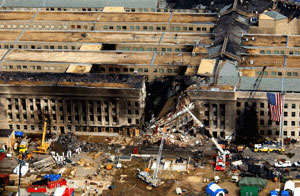 If an airplane crashed into this building, where did it go? I have saved all the newspapers going back to the beginning of the crisis, and searched many web pages; this image matches what was published on Sept. 12, photographed on Sept. 11. In none of the news photos is there any airplane wreckage visible, nor scenes of it being removed. Jet airliners are substantial pieces of equipment. A 757 may be made mostly of aluminum and plastic compounds, but it still contains about 100 tons of material. That would need to go somewhere.
If an airplane crashed into this building, where did it go? I have saved all the newspapers going back to the beginning of the crisis, and searched many web pages; this image matches what was published on Sept. 12, photographed on Sept. 11. In none of the news photos is there any airplane wreckage visible, nor scenes of it being removed. Jet airliners are substantial pieces of equipment. A 757 may be made mostly of aluminum and plastic compounds, but it still contains about 100 tons of material. That would need to go somewhere.
The common theory is that the crash was so hot, it burned up on impact. If the plane burned up and vanished, that would indeed be a hot fire; it would take the building — or the part of the building that it had impacted — with it. You would be looking at a picture of the Pentagon reduced to ashes, not recognizable parts. What we see in the detail below is a pile of ordinary rubble, located right at the supposed impact point. If there is nothing left of the airplane, why is there so much debris of the building left?
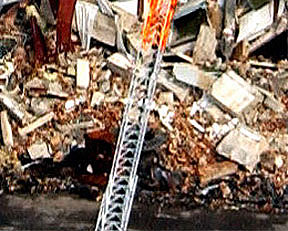 There is a certain mythology around the Pentagon, which is that it was made to withstand a bombing attack and is some kind of impenetrable magic fortress made by elves and dwarves, as if it were straight from the mind of J.R.R. Tolkien, or a superscientific thing with deflectors and force fields activated by Captain Picard. But just how magic would it be? Are all of its contents made of some kind of special substance that can withstand the degree of heat that it would take to make an airliner vanish?
There is a certain mythology around the Pentagon, which is that it was made to withstand a bombing attack and is some kind of impenetrable magic fortress made by elves and dwarves, as if it were straight from the mind of J.R.R. Tolkien, or a superscientific thing with deflectors and force fields activated by Captain Picard. But just how magic would it be? Are all of its contents made of some kind of special substance that can withstand the degree of heat that it would take to make an airliner vanish?
Next, we have a photo of the fire, again courtesy of the Army. Lots of others are here.
This is a view of the Pentagon burning taken some time between 9:43 a.m., the reported time of the air crash, and when the facade is widely reported to have collapsed at 10:10 a.m. One of my editors asked me why I thought this was not some other part of the building, the part besides where the airliner hit and that wall caved in. I looked at a lot of photos and figured it out, using a point of reference. Note the lopsided truck burning in the lower right. Below is another picture of the same location, taken later, on which I have increased the contrast to bring out the details. The same truck is visible in the lower image as well, in the lower right. We can now see that the most badly damaged part of the building, the part which fell down, is indeed the one depicted above. If this is the point of greatest damage, where then, is the point of impact of a jet airliner in the picture above?
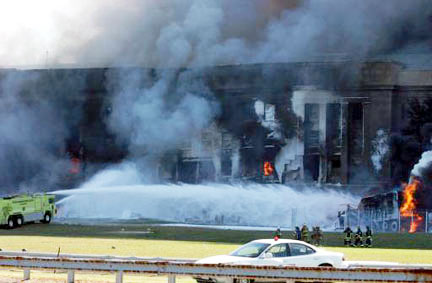 According to Boeing’s official specifications, the 757-200 airliner stands 45 feet off the ground, and the ceiling of the passenger cabin stands about 22 or more feet off the ground. The Pentagon stands 5 floors tall. We would expect to see a path of entry at least 25 feet in diameter, which would — at the least — shatter that portion of the building (100 tons in the shape of a missile moving at close to the speed of sound), almost halfway up to the roof — if there was anything left standing at all.
According to Boeing’s official specifications, the 757-200 airliner stands 45 feet off the ground, and the ceiling of the passenger cabin stands about 22 or more feet off the ground. The Pentagon stands 5 floors tall. We would expect to see a path of entry at least 25 feet in diameter, which would — at the least — shatter that portion of the building (100 tons in the shape of a missile moving at close to the speed of sound), almost halfway up to the roof — if there was anything left standing at all.
Or are we expected to accept and believe that an airliner hit this structure at close to the speed of sound, and the building remained standing, while the airliner itself vanished, leaving behind only its flight recorders and tail section? Where is the tail? We might wonder.
According to a March 7 report on CNN.com, “The impact of the airliner and leaking fuel produced intense heat and a smoky blaze that contributed to the collapse of part of the Pentagon. The attack penetrated three of the building’s five rings [remember that, three of the five rings], and the fire spread through the wooden roof.” Okay, so CNN is telling us that there was “intense heat and a smoky blaze.”
That, in theory, would be consistent with the crash of a jet liner and its 7,000-plus gallons of jet fuel, and breaking through three of the five rings sounds fabulously accurate, too. We know that the crashes into the World Trade Center created fires hot enough to melt steel and bring the buildings down.
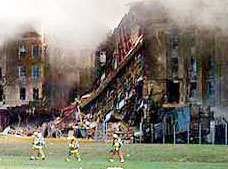
In this detail, below left, of an official damage overview photo posted at Defenselink.mil, we see the left-hand section of the building next to where this intensely hot, smoky blaze — supposedly hot enough to melt titanium — occurred.
The demolished portion of the Pentagon was less than 75 feet wide (considerably less than the jet’s wingspan of 125 feet), so what we are looking at, in the photo on the left, must be within 35 feet — a very short distance — of the supposedly huge jet fuel fire.
One last image. We have been told by CNN, the Jerusalem Post, and other sources, that the crashing airliner went through multiple rings of the Pentagon, which supposedly slowed down the airliner. However, it appears that the one ring that was demolished is called he “E Ring.” The next ring in is called the “D Ring.” Below we have a detail of the D Ring right behind the demolished section of the E Ring. Besides an ugly office building, what do you see?
Secondary Sources
There have been some newspaper reports of the Flight 77 wreckage, though they are few and far between, and rather sketchy. Each seems to be based on a different theory of what happened. CNN, for instance, told us that the airplane went through three of the five rings of the Pentagon, which accounts for its disappearance, if you don’t look at the photos of the scene.
One of my editors in New York was able to come up with a photo caption from the Nov. 27, 2001 Philadelphia Inquirer; I have not seen the photo, taken by Scott Hamrick, but the caption reads: “Pieces of melted and fused aluminum from the destroyed airplane are recovered from the damaged area of the Pentagon.” But a melted hunk of something or other could be something or other.
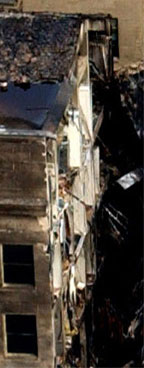
For reference, this is what the impact of an airliner full of fuel exploding looks like: the moment of impact of Flight 175 into tower two of the World Trade Center.
The Jan. 15, 2002 Jerusalem Post makes reference to wreckage and some details of the accident:
“On that morning, American Airlines Flight 77 plowed into the nearly completely renovated ‘wedge one’, as it is called, traveled through the Pentagon at a 45-degree angle and penetrated the un-renovated ‘wedge two’, the next in line for reconstruction.”
According to this report, the damage is going from one wedge to another, not directly in through the rings. The photos don’t support that.
The article continues, “A total of 125 Pentagon employees and 64 passengers were killed. The plane, except for its tail, disintegrated as it passed through the building’s reinforced concrete.”
Tail is made of plastic compounds and aluminum alloys, which is presumably why the aircraft “disintegrated” as it passed through the building. The jets and landing gear are made of titanium and chunks of them would be expected to survive even the hottest fire.
Somehow they did not make it, but the tail did. But where is the tail? Or a piece of the tail, with the American Airlines logo? That would make a nice news photo.
The Jerusalem Post article continues, “Brett Eaton, who is one of many people overseeing the ‘Phoenix Project’ — as the effort to rebuild the destroyed area is called — says there were roughly 2,600 people in the area of impact. ‘To have only 125 deaths is incredibly fortunate’, Eaton said. Workers attribute the relatively low number of casualties in part to modern construction techniques used in the renovated section. Reinforced walls slowed the plane as it penetrated the concentric rings of the Pentagon and prevented the immediate collapse of the structure above the area of impact.”
The “concentric ring” issue is worth another mention. If the airliner plowed through three rings and burned in a hot enough fire to destroy the entire airplane, why was only the outer ring involved in the fire (see above photos for context)?
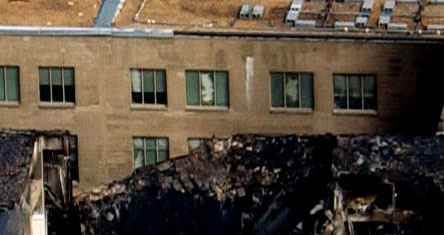
Each media, confronted with inconsistent facts, needs to construct a story plausible in the writer’s mind, and the editor’s, and the reader’s, about how that airplane vanished. I have, alternately, heard other versions: a Canadian Army rescue worker told us the airplane “cartwheeled” on the lawn, for example, and he says he saw a video.
Then there is the “the plane went in at a 45-degree angle” theory, which we hear a lot. It is, in fact, the official theory, covered in a recent report to Congress put out by Donald Rumsfeld’s office. (Note: the link takes you to a PDF document for which you need Adobe Acrobat Reader.) This presents the theory that the airplane struck the building from the southwest at a 45-degree angle to the building’s west face.
The assertion is that the debris moved through the concentric rings (some reports say three rings, some say four and some say five). The problem with this theory is that in between the rings are outside areas, and if the debris moved, then it would have been followed by jet fuel, bringing fire just about everyplace it went.
But especially if we compare the Pentagon to the World Trade Center disaster, the major difference — which would likely be emphasized due to the reinforced structure of the Pentagon — is that there is surprisingly little evidence of a fuel fire next to the building, indeed, the grass is visibly green right up to the building. Perhaps most telling of all, water and not foam was used on this fire.
Many Versions, No Explanation
Taken separately, any of the versions of what happened sounds pretty good. Put them together and nothing makes sense. Especially if you use the photographs. (Here are some satellite photos). In short, one needs either airplane wreckage or evidence of a fire hot enough to destroy that wreckage. Indeed, we need evidence of a jet fuel fire, particularly considering the claim in the Pentagon’s own report telling us that the airplane was “fully loaded.”

Some people have said, in addressing the fact that the evidence of the missing airplane crash is found in photographs of the scene, that we are in the age of Photoshop. Photos can be changed. But I bid you: if we had a photograph of a supposed airplane crash lacking the airplane and wanted to make it look like there was a crash, we would put the airplane in, rather than it out.
It is also worth mentioning that six months after this supposed air-crash, the so-called “security camera shots” appear — only after the Asile.org French web page appears. Take a look at the security camera video. See if it makes sense to you. Remember that a 757’s cabin height would reach almost halfway up to the top of the building, and the tail would reach close to the top of the structure. Do you see an airplane or anything resembling one of that size in the security camera shots?
Confronted with these images, most people say, “But there must be an airplane in there,” “It had to have happened,” and, “There could not be a coverup this big.” But I would suggest that we cannot allow the fact that there is no airplane in the picture, and no evidence of a crash, convince us that there is an airplane in the picture, or that a crash occurred there.
And there is a much simpler explanation: something else happened in these pictures. The pictures are much more consistent with, say, an explosion inside the building.
Making a Little Sense
Some have questioned why the military would leave images on its web sites that seem to show that there was not a crash. I think the answer is pretty simple. The fact that the images are available, by itself, would be enough to throw most curious people off the scent. It seems honest to post photographs. Most reporters would not even bother to check. “Oh, the photos are posted on the Army web page? The whole thing must be accurate, and like usual, the other crap is a hoax.” Remember, you are reading the internet, home of bullshit and shopping carts.
I offer two other possibilities.
The whole thing is so obvious as to be a setup. Sooner or later, people would figure out that the pictures didn’t match the descriptions of what happened. Why? Here I would have to speculate. If we presume an evil plot, one possibility is to destroy trust of the people in government and the media. This would disorient a lot of people, and facilitate a kind of psychological divide-and-conquer. This line of thought came via one of my astrology students, in whose philosophy class the subject surfaced today.
My impression, which arrived as a kind of glowing Aha! in the middle of doing this research, was that it was all a setup by Spirit to leave the door to truth open.



